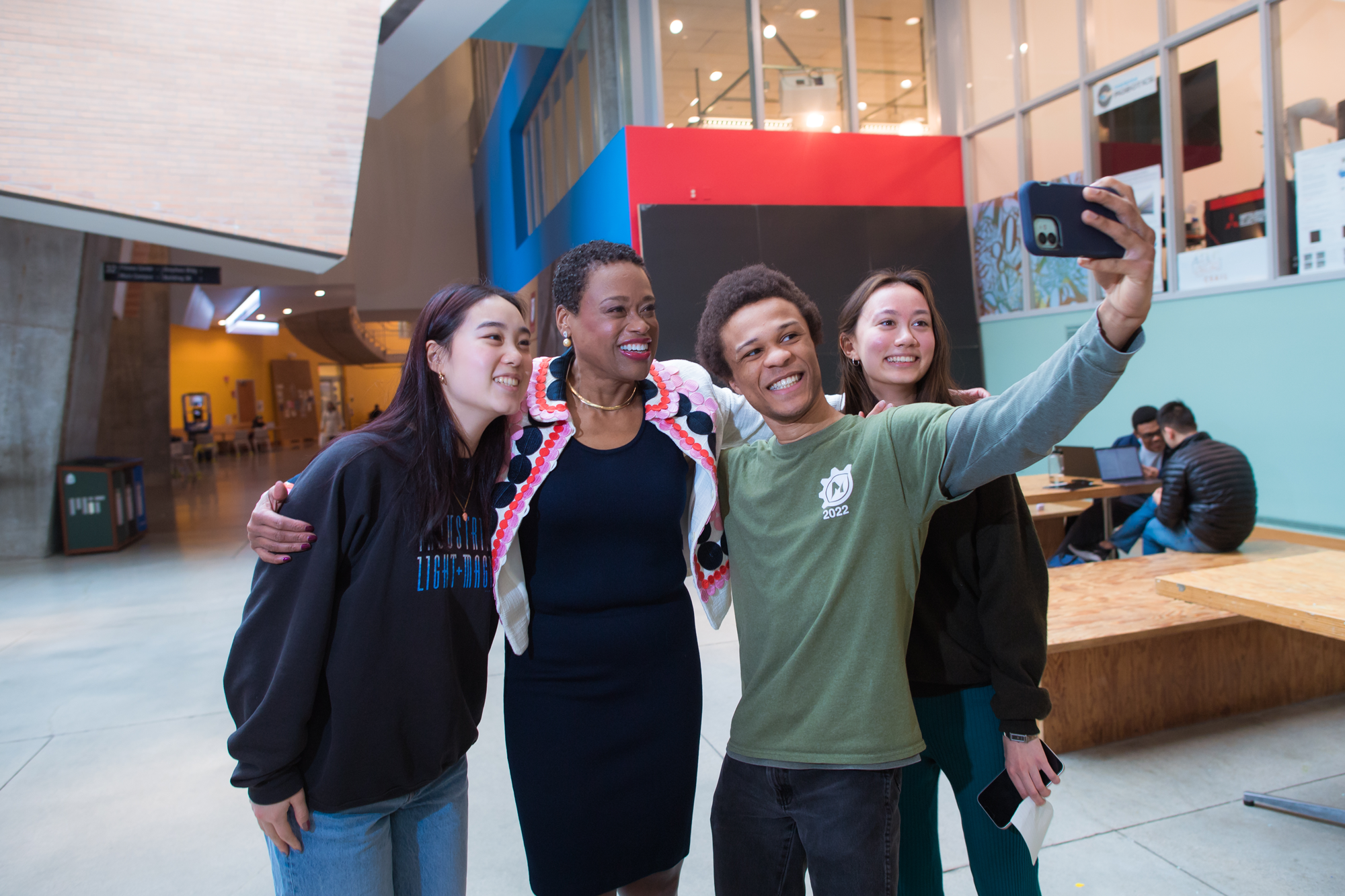

Suzy Nelson
Chancellor Melissa Nobles with MIT students.
PHOTO: GRETCHEN ERTL
DG: You have been MIT chancellor for a little over three years. What have you reflected upon most during that time?
MN: I am fortunate to have engaged with our talented students over every phase of my career at MIT, from serving as a faculty member in the Department of Political Science, then as department head, later as dean of the School of Humanities, Arts, and Social Sciences, and now as chancellor.
This path has provided me with unique insight into the perspectives and experiences of our students in and outside the classroom. I am continually inspired and amazed by their curiosity, ingenuity, passion, and tenacity. Their drive to challenge themselves and each other is infectious and constitutes a key ingredient in MIT’s “secret sauce.”
It is therefore more important than ever that the well-being of our students remains at the center of our work. The world-class teaching, learning, and research that is MIT’s hallmark cannot be sustained without also preparing our students for life after MIT. We provide the opportunities, services, and support that empower our students to meet the demanding requirements of an MIT education while also providing them with the tools to become happier, healthier, and more successful individuals. In short, we want our students to thrive—that is what it means to educate the whole student.
DG: What are the primary elements of educating the whole student?
MN: There are three key elements in our approach: supporting academic success, fostering community and well-being, and cultivating personal and intellectual growth. We want students to gain a deeper understanding of themselves and the world around them as they drink from the proverbial MIT firehose. We help them uncover new passions and embrace new experiences as they learn to care for themselves physically, emotionally, and spiritually.
A good example of this work is the collaboration between the Wellbeing Lab and the Department of Athletics, Physical Education and Recreation, which provides programming that benefits the overall well-being of our students and the broader community through yoga classes, drop-in sessions with nutritionists and personal trainers, group exercise classes, and massage therapy. We continue to seek ways of weaving well-being—and access to a rich and fulfilling spectrum of experiences—into student life.
DG: The concept of educating the whole student is championed by liberal arts institutions across the United States. How is it different here at MIT?
MN: We are building on decades of transformative work across MIT seeking to improve the student experience and ensuring academics and research, especially in science and technology. However, academic excellence and pathbreaking research ultimately depend on, and are carried forward by, talented individuals who require the same level of investment and attention that academic disciplines receive. Striking this balance has been a challenge for MIT historically. We need to continue making purposeful efforts to imbue our culture and educational mission with a focus on those who make it all possible.
Another way to think about educating the whole student is focusing on what we refer to as the three P’s: people, places, and programs. Of those three, the first “P” is the most important… people. That is why ensuring access to an MIT education remains a top priority for my office and a key component of the Whole Student Initiative. Scholarships are awarded based solely on financial need, and close to two-thirds of all undergraduates receive some form of scholarship support during their four years here. Enhancing our ability to provide scholarships will continue to be a key priority for my office moving forward, as we seek to ensure that an individual’s financial situation does not create a barrier to experiencing all that MIT has to offer.
DG: Can you expand on how “places” affect our students?
MN: Learning is not exclusive to the classroom or lab; students learn and grow through all aspects of their MIT experience, and we must ensure that our campus facilitates such learning. From casual conversations over foosball, pizza, or table tennis to late-night problem sets, team meetings, and study groups, our built environment must enable unstructured and organic interactions to help students learn from one another and about themselves.
Over the past year we completed renovations to the Stratton Student Center, which houses our Wellbeing Lab and dance studio, and reopened an enhanced and entirely redesigned Sports Performance Center. These improvements are having a tremendous and positive impact on the student experience. Looking ahead to the fall of 2025, we will open the Undergraduate Advising Center in a central location along the Infinite Corridor. In that space, students can seek guidance from advisors assigned to each of them and find resources as they navigate through their MIT journey.
We also recently opened the West Campus Graduate Junction residence, significantly increasing the number of on-campus apartments available to graduate students. There’s also a comprehensive renovation of East campus taking place and a planned renewal of McCormick Hall.
This work continues in earnest as our residences, athletic fields, dining halls, and study spaces require consistent investment to ensure that MIT’s world-class education has the facilities to match.
DG: MIT students must meet demanding academic requirements. How can they balance that with self-care and still excel?
MN: We have invested heavily in efforts to support our students holistically. From the Wellbeing Lab, currently in its second year of operation, to the Division of Student Life’s DoingWell program, with its broader focus on educating students about self-care and instilling a sense of belonging, we continue to put the whole student at the center of each individual’s journey through MIT. Educating the whole student does not interfere with or take away from the academic rigor of the MIT experience. Indeed, it’s quite the opposite. A well-rested, nourished, and socially connected student will perform better in the classroom and lab, and it is our job to make sure that is the norm, not the exception.
Moreover, well-being is not only an Institute priority; it is also a priority of our incoming students and their parents, who have expectations about student well-being, socialization, and personal growth. Remaining a global leader in academics and research is simply not enough, and I believe we can do more.
DG: Is there anything else you would like readers to know about our work?
MN: We will continue to support our students’ development each and every day, while also building community and a sense of belonging so that they have the skills and perspectives necessary to succeed as students and in life.
This important work requires partners across all areas of MIT, and I welcome the opportunity to connect with anyone interested in learning more about how they can engage with us to help move these critical initiatives forward.
Give now: Support the Whole Student Initiative
Student Life as a Launchpad
Suzy Nelson is the vice chancellor and dean for student life at MIT, overseeing the Division of Student Life. Here’s how she views her mission.
“The experiences students enjoy outside the classroom and lab help prepare them for life at MIT and beyond. The opportunities to get those experiences are almost as limitless as our students’ imaginations.“We have more than 500 student groups and countless other ways for a student to get involved in campus life. Perhaps they are a student-athlete or serving on the government of their residence hall, fraternity, sorority, or independent living group. Maybe they are mentoring new students or promoting wellness through an organization like MindHandHeart.
“However they choose to participate, students stand to learn invaluable lessons about leadership, teamwork, and well-being while forging relationships that can last a lifetime.
“MIT is known for bold ideas. Student life at MIT provides launchpads for those ideas, making the student experience here a laboratory for personal growth and achievement. ‘We are here for students’ is more than the Division of Student Life’s motto—it’s our pledge to support students and help ensure a vibrant and singularly MIT experience for everyone who seeks an education at the Institute now and in the future.”